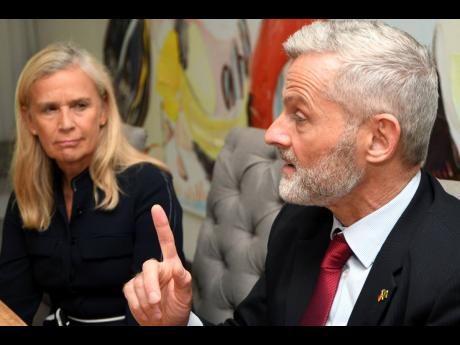It’s energy ministry’s call
Johnson Smith defers to Vaz on prospects of Venezuelan oil imports
Talk of Jamaica’s allies in North America and Europe possibly easing sanctions against oil-rich Venezuela to avert an energy crisis amid global sanctions levied against Russia could lead to the Holness administration rekindling the island's traditional ties with the South American nation.
But Minister of Foreign Affairs and Foreign Trade Senator Kamina Johnson Smith would not comment on the possibility of repairing soured relations with Caracas through the resumption of oil imports, stating only that the Daryl Vaz-headed energy ministry would determine any policy shift.
“There is no decision in respect of oil imports that would be taken that is not guided by the Ministry of Science, Energy and Technology. So any issues in respect of the need for more oil would be guided by them,” Johnson Smith said on Sunday.
Jamaica currently sources both crude oil and finished product from Colombia, Ecuador, Brazil, and Barbados and is making arrangements to obtain oil from Nigeria.
Pressed on whether sourcing oil from Venezuela would be cheaper, Winston Watson, managing director of Petrojam, said that that idea was mere “speculation”.
“We don’t know what Venezuela will be selling us at. ... We have not discussed anything with them. You would have to negotiate, and you would have to see what price they are selling at,” he told The Gleaner on Sunday.
Venezuela, which has been under economic sanctions from the US since 2019, accounts for approximately 18 per cent of global oil reserves while Russia accounts for roughly five per cent.
But Europe depends heavily on Russian oil and gas, leverage the Kremlin believes will have sway over the continent’s clients and buy time in its monthlong war with Ukraine.
With the US banning energy imports from Russia and the United Kingdom’s planned phasing out of Russian oil imports by the end of the year, there is expected to be a significant supply shortfall.
Washington and some European countries have resorted to using backchannels to consult with Venezuela, Saudi Arabia, and the United Arab Emirates to tap oil supplies to fill that deficit.
The move has, however, raised several questions of how long the West will maintain the punishing sanctions against Russia and whether principle will trump economic interest.
In a Gleaner interview on Wednesday, head of the European Union Delegation to Jamaica, Ambassador Marianne Van Steen, sought to defend the position taken by some countries, suggesting that their engagement with oil-exporting authoritarian regimes was fuelled by a dilemma.
“We are fighting a war with President Putin,” Van Steen said when quizzed on the matter, stressing that the EU was in a more precarious position than the US.
Europe is heavily dependent on oil imports from Russia, which is the second-largest crude oil exporter behind Saudi Arabia.
However, Van Steen agreed with her German counterpart, Jon Hendrik von Thiel, charge d’affaires at the German Embassy in Kingston, who said the US decision, in particular, to renew talks with Venezuela was premised on avoiding a crisis - “unless you want to wreck the world economy”.
“It’s a dilemma ... . If you have two bad choices, you take the least bad one,” von Thiel said.
Sanctioning Russia’s oil exports is a key strategy in getting Putin to pull out of Ukraine but would be more effective with the full buy-in of Europe.
“We hope that Putin is re-evaluating the situation and coming to the conclusion that he is not unhinged, that the cost is too high, and that Russia is losing too much.”
Von Thiel said the true loss being incurred by Moscow is not being revealed to Russians, who mainly depend on news from state media.
“On the Russian TV, they get only victorious soldiers and happy men. Everything is covered up, but these guys will come back and tell the true story later. The losses he’s having are tremendous. He is not winning,” the charge d’affaires said of Putin.
The diplomat argued that Putin has sought to reverse global progress with the invasion of Ukraine and should be liable for reparations.
“None of the reasons holds water. There is no reason for people and babies and women and old people to be dying. Infrastructure is destroyed for nothing. There’s talk of US$500 billion. It might be more to reconstruct this country. Where does this money come from? The Russians should pay reparations, but will they pay? Probably not,” he said, conceding that the international community may have to shoulder the bulk of recovery financing.
The Holness administration compulsorily acquired Venezuela’s stake in state-owned oil refinery Petrojam in 2019, putting the funds in an escrow account in a bid to escape United States sanctions.

